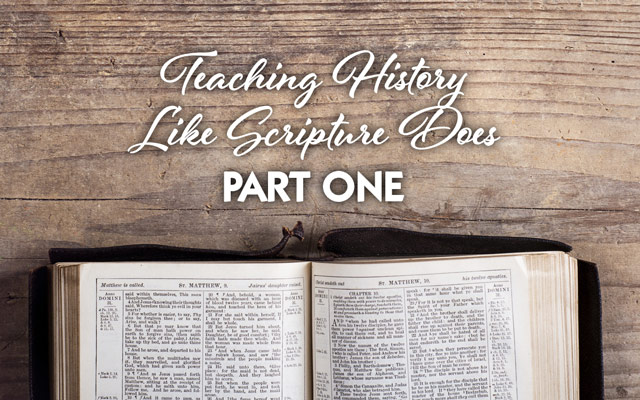Teaching History Like Scripture Does – Part One


Did you know of the Bible‘s sixty-six books, forty are historical accounts? And of the 26 which are not technically defined as such, most have major historical pillars, such as Paul’s argument for justification by faith in his Roman epistle and the many poetic hindsights in Psalms. Even Revelation is a prophetic book of history yet to be. Is this already begging a question in your mind? Why would the Almighty author a book over a 1,500 year span, inspiring 40 human scribes of which cover nearly two-thirds of history? Is it because without history we are a lost people, actors without a script, rats with no rhyme or reason to our scurry other than to run from one trap to another? We have no purpose, for we know not what has been done before; no wisdom, for we do not access the knowledge of time; and no balance because we believe we and our peers know all and see our way as the only way humanity has ever functioned.
But honestly, it should not surprise us when the world little values history. Rather, we should engage our energy not in finger pointing, but in thumbing through the works of old. Because Scripture is God-breathed, we know its history is true and its methodology the greatest ever given to man. In short, the history of mankind finds its Alpha and Omega in the Bible.
The Twin Songs of History
In stark contrast to the naturalist origins taught to most American children today, Scripture’s view of history is one full of glory for God and hope for man. This view finds its most concentrated form in both Psalm 77 and 78 or what I call the Twin Songs of History. Space does not permit me to record them here, but please follow along and note their themes.
Psalm 77
The psalmist, Asaph, records a season when he wondered if his tears were seen by God, verses 7-8 giving words to his perplexity:
“Will the Lord cast off for ever? and will he be favourable no more? Is his mercy clean gone for ever? doth his promise fail for evermore?”
Yet, notice how Asaph’s faith is strengthened in verse 11:
“I will remember the works of the LORD: surely I will remember thy wonders of old. I will meditate also of all thy work, and talk of thy doings.”
Asaph’s faith remains strong, not because of evidence he can feel or see, but because of God’s works and wonders of old—wonders and works recorded in history.
Psalm 78
Also penned by Asaph, Psalm 78 mentors us in how to pass this hope in God’s wonders and works to the next generation.
“We will not hide them from their children, shewing to the generation to come the praises of the LORD, and his strength, and his wonderful works that he hath done . . . That they might set their hope in God, and not forget the works of God, but keep his commandments: And might not be as their fathers, a stubborn and rebellious generation; a generation that set not their heart aright, and whose spirit was not stedfast with God.” Psalm 78:4, 7-8
Again, the purpose of history is so we (and children yet to be born) might set our hope in God. And from the beginning the Scriptures do so by answering the biggest questions the soul of man can ask, questions we will unearth in a coming post.
Kenzi Knapp is a follower of Christ, homeschool graduate and student of history. A fourth generation Missourian she enjoys writing about daily life enrolled in Gods great course of faith and His story throughout the ages at her blog, Honey Rock Hills.














































